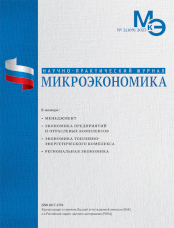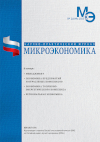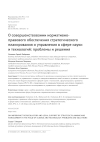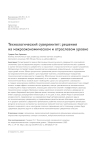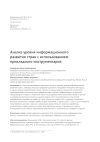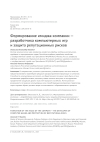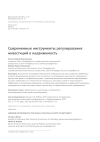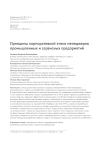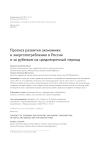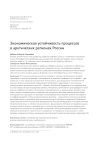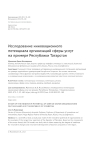On improving the regulatory and legal support of strategic planning and management in the field of science and technology: problems and solutions
DOI: 10.33917/mic-2.109.2023.5-18
The article outlines the features of various national systems of strategic planning and management and approaches to improving such a system in the context of the formation of a new model of management of science and technology in Russia; the problems of implementation of the Law №. 172-FZ and proposals for improving the regulatory and legal support of strategic planning and management in the field of science and technology are formulated.
References:
1. Glazyev S. Yu. Theoretical foundations of strategic planning and management. Innovations. 2020;2(256):14-23. (In Russ.).
2. Komkov N.I. Development of program-target management in the USSR and Russia. URL: https://cyberleninka.ru/article/n/razvitie-programmno-tselevogo-upravleniya-v-sssr-i-rossii
3. Federal Law of June 28, 2014 No. 172-FZ «On Strategic Planning in the Russian Federation». – Access from the information and legal system «Garant».
4.Federal Law of 20.07.1995 No. 115-FZ «On State Forecasting and Programs of Socio-Economic Development of the Russian Federation» (with amendments. dated 09.07.1999). – Access from the information and legal system «Garant».
5.Decree of the President of the Russian Federation No. 144 of February 15, 2021 «On some issues of the Presidential Council for Science and Education».– Access from the information and legal system «Garant».
6.Decree of the President of the Russian Federation dated March 15, 2021 No. 143 «On measures to improve the effectiveness of the state scientific and technical policy».– Access from the information and legal system «Garant».
7.Decree of the President of the Russian Federation of December 1, 2016 No. 642 «On the Strategy for Scientific and Technological Development of the Russian Federation»
8.Lenchuk E. B., Filatov V. I. Strategic planning – the way to sustainable development of the Russian economy. Economic and social changes: facts, trends, forecast. 2018;11(4):35–47. (In Russ.).
9.Smirnova O. O., Bocharova L. K., Belyaevskaya-Plotnik L. A., Bogdanova Y. N. Conceptual approaches to the formation of architectural documents of strategic planning in Russia. MIR (Modernization. Innovations. Development). 2019;10(4):440–456. (In Russ.).
10.Lenchuk E. B. Strategic planning in Russia: problems and ways of solving. INNOVATIONS. 2020;2(256):24–28. (In Russ.).
11.Decree of the President of the Russian Federation dated July 2, 2021 no. 400 «On the National Security Strategy of the Russian Federation». – Access from the information and legal system «Garant».
12.Plan for the preparation of regulatory legal acts of the Government of the Russian Federation (documents) necessary for the implementation of the norms of the Federal Law of June 28, 2014 No. 172-FZ «On Strategic Planning in the Russian Federation» (approved on September 26, 2014 N 6424p-P13). – Access from the information and legal system «Garant».
13. Decree of the President of the Russian Federation dated November 8, 2021 No. 633 «On Approval of the Fundamentals of State Policy in the Field of Strategic Planning in the Russian Federation». – Access from the information and legal system «Garant».


